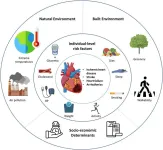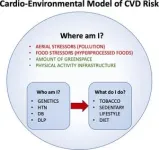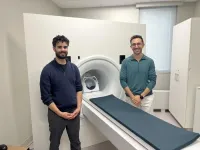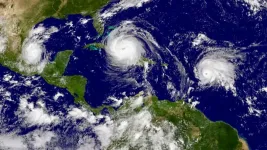(Press-News.org) Philadelphia, September 13, 2023 – There is already robust evidence that people living with cardiovascular disease are disproportionately affected by poor air quality and extreme temperatures, in large part due to climate change, the greatest threat to human health of the 21st century. In this special theme issue of the Canadian Journal of Cardiology, published by Elsevier, noted experts comprehensively review how climate change occurs and increases the risk of cardiovascular disease and provide practical tips on how to become a climate-smart cardiovascular healthcare provider.
Not long ago, climate change was a fringe topic deemed only to affect rare species and ignored by many. The Global Burden of Diseases, Injuries, and Risk Factors Study (GBD) 2019 estimated that nine million people died prematurely because of air pollution in 2019. Nearly 62% of these deaths were related to cardiovascular diseases, highlighting the fact that climate change is not only a general healthcare issue, but also a major cardiovascular health issue.
This issue of the Canadian Journal of Cardiology is guest-edited by Sadeer Al-Kindi, MD, Houston Methodist DeBakey Heart and Vascular Center; Matthew Bennett, MD, FRCPC, University of British Columbia; Daniel Gagnon, PhD, Montreal Heart Institute; Sanjay Rajagopalan, MD, FACC, FAHA, Harrington Heart and Vascular Institute; and François Reeves, MD, FRCPC, University of Montreal.
The Guest Editors explain: “The health effects of heat extremes and poor air quality notably drew attention recently because of the 2021 heat dome that resulted in 619 heat-related deaths in British Columbia, Canada, the European summer of 2022 that was the hottest on record and caused an estimated 61,672 heat-related deaths, and the wildfires in Québec, Canada, that caused poor air quality across vast areas of Northeastern America during the summer of 2023. Within this context, it has never been more relevant to understand how environmental influences affect cardiovascular health to mitigate their effects.
In addition to extreme weather and air pollution being associated with cardiovascular events, it is increasingly recognized that the comprehensive lifetime exposure of individuals and populations to their surrounding environment (the exposome) is closely interlinked to cardiovascular health and wellbeing. Issam Motairek, MD, Case Western Reserve University School of Medicine, and colleagues review the relationship between the exposome and cardiovascular health, highlighting the epidemiological and mechanistic evidence of environmental exposures on cardiovascular disease. This review also reinforces the importance of minimizing long-term pollutant exposure for the prevention of cardiovascular disease.
Aerial nano-aggressors (air pollution), food nano-aggressors (hyperprocessed food), the level of greening, and an environment encouraging (or not) physical activity are major environmental determinants of heart health. François Reeves, MD, FRCPC, and Brian J. Potter, MDCM, SM, FRCPC, both of the University of Montreal, propose a cardio-environmental model for cardiovascular risk assessment of easily evaluated factors by asking: (1) who is my patient? (family history, ethnicity, traditional risk factors, body mass index, and comorbidities); (2) what does my patient do? (eating habits, smoking, drugs, physical activity); and (3) where does my patient live? (air quality, food quality, urban environment).
A review by Barrak Alahmad, MD, PhD, Harvard T.H. Chan School of Public Health, and colleagues shows that climate change and air pollution worsen each other leading to several ecosystem-mediated impacts. They highlight how increases in hot climates as a result of climate change have increased the risk of major air pollution events such as severe wildfires and dust storms and that altered atmospheric chemistry and changing patterns of weather conditions can promote the formation and accumulation of air pollutants, a phenomenon known as the climate penalty.
Extreme heat events, in which temperature and/or humidity are sufficiently elevated to generate health impacts at a population level, are an important consequence of the accelerating climate crisis. Daniel Gagnon, PhD, and colleagues describe how the human body interacts with a hot environment during physical activity, summarize current hot weather guidelines for physical activity, and conclude with practical strategies to encourage safe physical activity in hot weather.
David Kaiser MD, MSc, McGill University, and colleagues point out that cardiovascular clinicians and researchers are uniquely placed to help prevent heatwave mortality by identifying patients who are most at risk and using education, referrals, and advocacy to contribute to public health interventions.
Hypertension is responsible for nearly nine million deaths worldwide annually; environmental pollution increases the incidence of hypertension and exacerbates its severity. Environmental aggressors include the adverse vascular effects of air pollution, lack of green spaces, increased risk of infection, lack of physical activity, temperature effects, noise pollution, disturbance of circadian rhythm, and economic disparities such as limited access to healthcare. Francisco J. Rios, PhD, McGill University Health Centre, and colleagues highlight their crucial impact and how these determinants influence diverse communities. They also address opportunities and challenges for new research to address knowledge gaps in our understanding of the molecular mechanisms through which environmental factors influence development of hypertension and associated cardiovascular disease.
Adverse air quality increases the risk of many cardiovascular diseases including atherosclerosis and, as a result, the incidence of myocardial infarction, stroke, and cardiovascular death. In addition, acute and chronic increases in air pollution increase the risk of atrial and ventricular arrhythmias, heart failure incidence, and heart failure-related hospitalizations. A review by Matthew Bennett, MD, and colleagues discusses the association between both acute and chronic air pollution exposure and arrhythmia incidence, morbidity and mortality, and the purported pathophysiological mechanisms. They highlight several pathways mediating this association, including increases in inflammation, oxidative stress, mitochondrial and autonomic dysfunction, cardiac structural changes, and altered calcium, potassium, and sodium channel function.
Cavin K. Ward-Caviness, PhD, and Wayne E. Cascio, MD, both of the US Environmental Protection Agency, found substantial evidence linking air pollution exposure to heart failure incidence and related hospitalizations. They propose that further studies specifically to identify data gaps will greatly improve our knowledge of the susceptibility of individuals with heart failure and interventions to reduce risks.
The World Health Organization has reported that more than 1.6 million healthy life-years are lost yearly from traffic-related noise in western Europe. Thomas Münzel, MD, University Medical Center Mainz, and colleagues provide an overview of the “so-called” nonauditory cardiovascular health effects of noise, including acute and chronic ischemic heart disease, heart failure, arrhythmia, and stroke. They also provide evidence from translational human and experimental noise studies and discuss maneuvers to mitigate noise effectively.
Khalid Al-Thalji, MD, University of Toronto, and colleagues describe how to incorporate environmental cardiology into medical education to create climate-smart cardiovascular health care providers to minimize the cardiovascular effects of climate change in patients and the general population, improve awareness of these effects, and create climate change advocates within the cardiovascular community.
The Guest Editors comment: “Through the education of cardiovascular healthcare practitioners, trainees, the public, and policy makers regarding how and to what degree climate change increases the risk of cardiovascular disease, the impact of environmental factors on cardiovascular health can be minimized."
Aditya Khetan, MD, McMaster University, and Sadeer Al-Kindi, MD, Case Western Reserve University, explain how patients can adapt to environmental risk and, in particular, what recommendations should be given to high-risk patients during “bad air” days and during times of hot or cold temperatures.
The Guest Editors conclude: “The association between climate change and cardiovascular events is clear. Cardiovascular health practitioners, as healthcare leaders and educators, can play a leading role in minimizing the effect of environmental factors on cardiovascular health. Ongoing and future research will help manage the influence of environmental factors on cardiovascular health to thrive in a warmer planet.”
END
Noted experts present detailed evidence on the impact of environmental issues on cardiovascular health
The September 2023 special issue of the Canadian Journal of Cardiology is devoted to the environmental determinants of cardiovascular health and disease, covering environmental influences, impacts on cardiovascular health and clinical practice
2023-09-13
ELSE PRESS RELEASES FROM THIS DATE:
Western researchers use AI to predict recovery after serious brain injury
2023-09-13
Two graduate students from Western University have developed a ground-breaking method for predicting which intensive care unit (ICU) patients will survive a severe brain injury.
Matthew Kolisnyk and Karnig Kazazian combined functional magnetic resonance imaging (fMRI) with state-of-the art machine learning techniques to tackle one of the most complex issues in critical care.
Whether it is the result of a stroke, cardiac arrest or traumatic brain injury, lives can forever be changed by a serious brain injury. When patients are admitted to the ICU, families are faced with tremendous uncertainty. Will my loved one recover? Are they aware of what is going on? Will they ever be the same ...
Flu: Interferon-gamma from T follicular helper cells is required to create lung-resident memory B cells
2023-09-13
BIRMINGHAM, Ala. – During a bout of influenza, B cells interact with other immune cells and then take different paths to defend the body. One path is the B cells that differentiate into antibody producing cells. Another path is the B cells that differentiate into lung-resident memory B cells, or lung-BRMs, that are critical for pulmonary immunity.
Unlike antibody-producing B cells that help fight the current infection, the long-lived, non-circulating lung-BRMs migrate to the lungs from draining lymph nodes. ...
Three University of Oklahoma faculty receive National Institutes of Health funding to maximize their research
2023-09-13
For the first time in one year, three faculty at the University of Oklahoma have received Maximizing Investigators’ Research Awards from the National Institutes of Health.
The recipients are Gallogly College of Engineering faculty Vivek Bajpai, Ph.D., John R. Clegg, Ph.D., and Stefan Wilhelm, Ph.D. The highly competitive five-year, $1,866,485 grants will support their ambitious research programs without the need to recompete for funding throughout the duration of their awards.
Bajpai, an assistant professor in the School of Sustainable Chemical, Biological and Materials Engineering, will lead the project, “Epigenetic and Transcriptional ...
UNIST, DGIST, and POSTECH consortium selected for 2023 ITRC Project in ‘Quantum ICT’ sector!
2023-09-13
The consortium, comprising of UNIST, DGIST, and POSTECH has been chosen for the esteemed 2023 University ICT Research Center Project (ITRC) by the Ministry of Science and ICT (MSIT). This prestigious selection recognizes their expertise in the ‘Quantum Information and Communication Technologies‘ sector. The consortium aims to develop advanced quantum technologies while nurturing exceptional master’s and doctorate-level talents. With a total funding amounting to 8.25 billion won—7.5 billion won from government subsidies—the project spans eight years.
The kick-off meeting held at UNIST on August ...
Human emmisions drive changes in north Atlantic ocean temperatures, west African rainfall, hurricanes
2023-09-13
A new climate study led by scientists at the University Miami Rosenstiel School of Marine, Atmospheric, and Earth Science found that temperature fluctuations in the tropical Atlantic Ocean temperature is largely driven by human-induced aerosol emissions, impacting rainfall in West Africa’s Sahel region and hurricane formation in the Atlantic.
The findings, published in the journal Nature, comes in a year when several hurricanes, including Hurricane Idalia, formed within days of each other over the tropical Atlantic.
“Our ...
WVU engineers study how to pull carbon out of building air to make methanol
2023-09-13
Researchers at West Virginia University have taken the first steps toward developing technology that can capture carbon dioxide in the air and use it for eco-friendly manufacturing of methanol. The process they have begun modeling — which involves pulling air from buildings — could increase the sustainable supply of methanol, one of the world’s most extensively used raw materials, while removing a planet-warming greenhouse gas from the atmosphere.
Project lead Xingbo Liu, who serves as professor, associate dean for research and chair of engineering ...
LSU Health New Orleans study identifies a potential new approach to PTSD treatment
2023-09-13
New Orleans, LA – An LSU Health New Orleans research study led by Siqiong June Liu, PhD, Professor of Cell Biology and Anatomy, has found that cerebellar inhibitory interneurons are essential for fear memory, a type of emotional memory formation. Inhibitory interneurons within the cerebellar circuitry act as gatekeepers and control the output of the cerebellar cortex. The formation of fear memory requires the activity of these interneurons. The findings, which ...
Scientists find good places to grow long-spined sea urchins, a starting point to restore ‘the lawn mowers of the reefs’
2023-09-13
Scientists call long-spined sea urchins “the lawn mowers of the reefs” because they eat algae that could otherwise smother reef ecosystems and kill corals.
That’s why researchers affiliated with the University of Florida Tropical Aquaculture Lab (TAL), who work at the Florida Aquarium’s Conservation Campus in Apollo Beach, are trying to raise as many urchins as possible.
Aaron Pilnick, a post-doctoral researcher at TAL, led newly published research that identifies substrates that help long-spined sea urchins – scientifically known as Diadema -- ...
Could a breakdown in the brain’s networks allow infections to contribute to Alzheimer’s disease?
2023-09-13
The human microbiome includes the genetic material of more than 100 trillion tiny microorganisms – fungi, yeast, bacteria, and even viruses, most of which hang out in our gastrointestinal tract to serve as guardians of our health. But when a healthy microbiome gives way to an imbalance — a “pathobiome” — any number of health problems can occur — from rheumatoid arthritis, to bacterial vaginosis. New data published this month in the journal Frontiers in Cellular and Infection Microbiology, from researchers at Drexel’s College of Medicine, gives more evidence to the possibility that developing a pathobiome ...
Cleaning products emit hundreds of hazardous chemicals, new study finds
2023-09-13
WASHINGTON – A peer-reviewed study by Environmental Working Group scientists has found unsettling details about the potential health risks of common household cleaning products.
The study, published today in Chemosphere, analyzed 30 cleaning products, including multipurpose and glass cleaners, air fresheners and more. The study revealed that these everyday products may release hundreds of hazardous volatile organic compounds, known as VOCs.
Researchers tested both conventional products and “green” cleaning products and detected a total of 530 unique VOCs in the 30 products. Of these, 193 VOCs were hazardous – identified ...
LAST 30 PRESS RELEASES:
New ‘scimitar-crested’ Spinosaurus species discovered in the central Sahara
“Cyborg” pancreatic organoids can monitor the maturation of islet cells
Technique to extract concepts from AI models can help steer and monitor model outputs
Study clarifies the cancer genome in domestic cats
Crested Spinosaurus fossil was aquatic, but lived 1,000 kilometers from the Tethys Sea
MULTI-evolve: Rapid evolution of complex multi-mutant proteins
A new method to steer AI output uncovers vulnerabilities and potential improvements
Why some objects in space look like snowmen
Flickering glacial climate may have shaped early human evolution
First AHA/ACC acute pulmonary embolism guideline: prompt diagnosis and treatment are key
Could “cyborg” transplants replace pancreatic tissue damaged by diabetes?
Hearing a molecule’s solo performance
Justice after trauma? Race, red tape keep sexual assault victims from compensation
Columbia researchers awarded ARPA-H funding to speed diagnosis of lymphatic disorders
James R. Downing, MD, to step down as president and CEO of St. Jude Children’s Research Hospital in late 2026
A remote-controlled CAR-T for safer immunotherapy
UT College of Veterinary Medicine dean elected Fellow of the American Academy of Microbiology
AERA selects 34 exemplary scholars as 2026 Fellows
Similar kinases play distinct roles in the brain
New research takes first step toward advance warnings of space weather
Scientists unlock a massive new ‘color palette’ for biomedical research by synthesizing non-natural amino acids
Brain cells drive endurance gains after exercise
Same-day hospital discharge is safe in selected patients after TAVI
Why do people living at high altitudes have better glucose control? The answer was in plain sight
Red blood cells soak up sugar at high altitude, protecting against diabetes
A new electrolyte points to stronger, safer batteries
Environment: Atmospheric pollution directly linked to rocket re-entry
Targeted radiation therapy improves quality of life outcomes for patients with multiple brain metastases
Cardiovascular events in women with prior cervical high-grade squamous intraepithelial lesion
Transplantation and employment earnings in kidney transplant recipients
[Press-News.org] Noted experts present detailed evidence on the impact of environmental issues on cardiovascular healthThe September 2023 special issue of the Canadian Journal of Cardiology is devoted to the environmental determinants of cardiovascular health and disease, covering environmental influences, impacts on cardiovascular health and clinical practice







